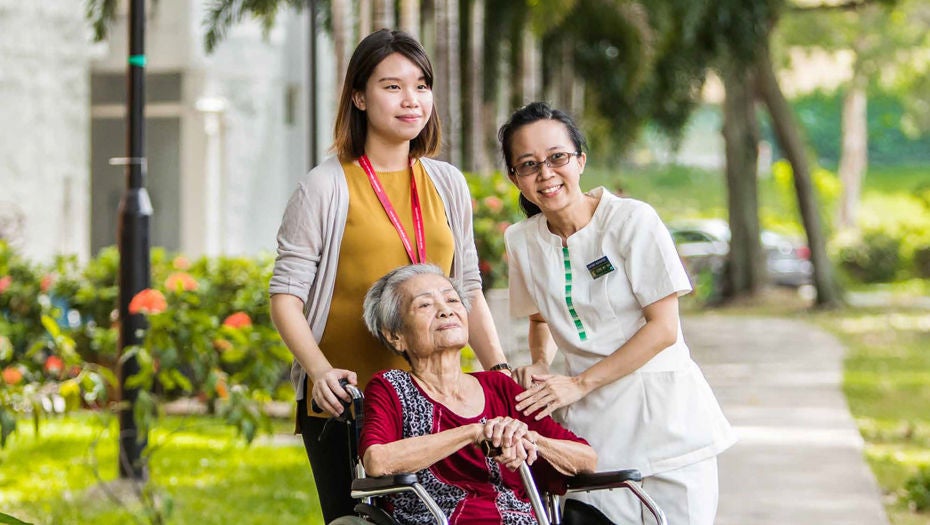
Mdm Cheng Kam Tai, 89, suffered compression fractures in her spine and was hospitalised for six weeks. She is now recuperating at home with the help of her god-sister and support from the SingHealth Regional Health System.
Mdm Cheng Kam Tai has been living alone in her one-room rental flat since 1987. She is known to be fiercely independent, but the 89 year-old’s eyes brighten at the sight of visitors, especially when her god-sister, Mdm Sally Ng, visits.
Their close friendship was forged 45 years ago when they were both working at the Mandarin Hotel. As Mdm Cheng grew old and frail, Sally began caring for her — visiting regularly, accompanying her for medical appointments and taking care of her daily needs. Even though Sally has to juggle work and family commitments, she assured Mdm Cheng that she can call for help, no matter the time of day.

On 22 January 2018 Mdm Cheng called Sally complaining of severe back pain. Sally immediately rushed her to Singapore General Hospital (SGH), where doctors discovered multiple compression fractures in her spine. She had to be hospitalized at SGH for two weeks, then moved to Bright Vision Hospital (BVH) for a month of rehabilitation.
From hospital to home
When she was discharged, Assistant Nurse Clinician Leong Mei Yan was assigned to help Mdm Cheng settle back in to life at home. As a Community Nurse with the SingHealth Regional Health System's Hospital to Home programme, Mei Yan conducts home visits to monitor Mdm Cheng’s condition closely and refer her to the care team if needed.
During one of the visits, Mei Yan noticed that Mdm Cheng’s pain had worsened. “I could sense her frustration because she couldn’t do basic household chores, cook her favourite dishes or even get proper rest because of the pain,” shared Mei Yan.
“As we spoke, I discovered that she hadn’t been taking her painkillers as prescribed because she was worried about the side effects.” Mei Yan patiently taught Mdm Cheng how to take the medications correctly to keep her pain under control and minimise risk of side effects.
As a Community Nurse, Mei Yan also acts as liaison with partners in the community to ensure that patients’ social needs are well taken care of. She works closely with Celestine Tay, a Cluster Support Case Manager at Thye Hua Kwan Moral Charities (THKMC) to address Mdm Cheng’s financial, emotional and social needs. “Celestine and I realised that Sally’s help alone was not sufficient to support Mdm Cheng after her discharge from hospital.”

Facing challenges together
They quickly built a rapport with Mdm Cheng, and Celestine arranged for THKMC Home Personal Care Services to assist Mdm Cheng with activities of daily living. She also arranged for a medical escort and transport service when Sally accompanies Mdm Cheng to her medical appointments. This lessens the burden of care on Sally and provides Mdm Cheng with a bit more comfort.

True to her self-reliant personality, Mdm Cheng refused financial assistance at first, even when it was clear that her savings would not be sufficient. She said, “It’s better that it goes to someone more needy.” With a little patience and some cajoling by Sally, Celestine and Mei Yan, she was persuaded to accept Medifund assistance and subsidies for her medical care.
“Nothing is too difficult!”

Despite her health conditions, Mdm Cheng continues to take things in her stride and lead life positively, confident in knowing that she has a network of support. “Nothing is too difficult. I have a hopeful outlook
on life. Even though I am a bit hard of hearing and now have to cope with backaches, I am happy.”
SingHealth Regional Health System
To achieve this, we collaborate with like-minded agencies across the health and social care sectors to identify population health needs, promote behaviour changes and develop sustainable programmes to improve As an academic RHS, we also leverage health services research to understand healthcare utilisation patterns and to facilitate appropriate interventions across the care continuum. Following the reorganisation of healthcare clusters in January 2018, we have adopted a One SingHealth, multi-site approach that allows us to synergise and scale up our programmes, together with SingHealth Community Hospitals and SingHealth Polyclinics, who are now also part of the RHS. Our commitment to promoting health in partnership with the community is reflected in our vision and mission statements:
Who we serve |
















 Get it on Google Play
Get it on Google Play